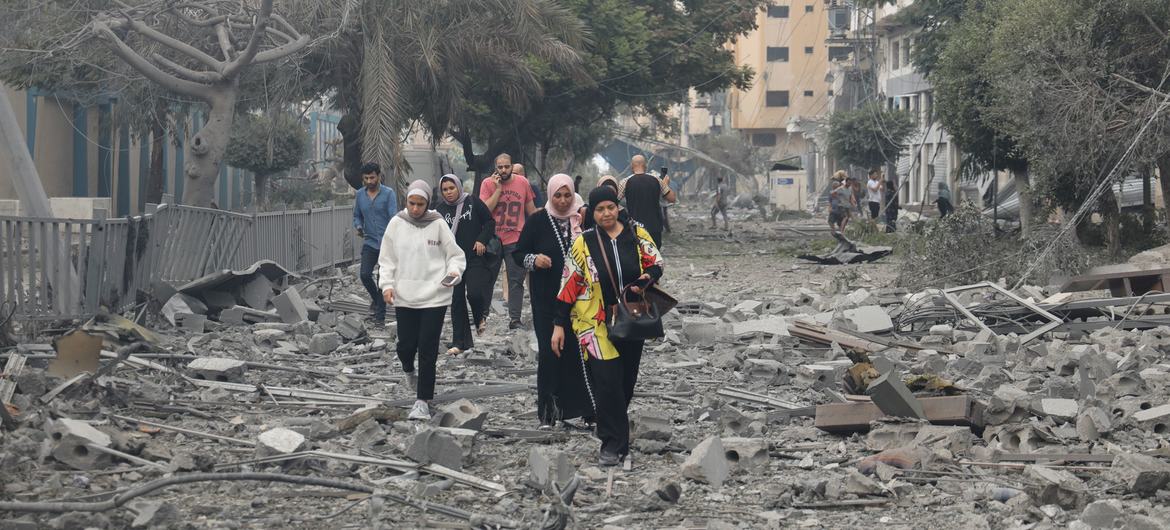The United States has presented an alternative draft resolution to the United Nations Security Council, urging for a temporary ceasefire in the Israel-Hamas conflict and opposing a major ground offensive by Israel in Rafah.
The move follows the U.S.’s indication of vetoing an Algerian-drafted resolution on Tuesday, which demanded an immediate humanitarian ceasefire, citing concerns that it could disrupt ongoing talks between the U.S., Egypt, Israel, and Qatar aimed at brokering a pause in the conflict and securing the release of hostages held by Hamas.
Until now, Washington had been reluctant to use the term “ceasefire” in any U.N. action concerning the Israel-Hamas conflict. However, the U.S. draft echoes language reportedly used by President Joe Biden in recent conversations with Israeli Prime Minister Benjamin Netanyahu.
The proposed resolution underscores support for a temporary ceasefire in Gaza at the earliest opportunity, contingent on the release of all hostages, and calls for the removal of all obstacles to the provision of humanitarian aid on a large scale.
A senior U.S. administration official, speaking on condition of anonymity, stated on Monday that the United States does not intend to rush the resolution to a vote and aims to allow time for negotiations.
For a resolution to pass, it requires at least nine votes in favour and no vetoes from the permanent Security Council members: the U.S., France, Britain, Russia, or China.
The U.S. draft text “determines that under current circumstances, a major ground offensive into Rafah would result in further harm to civilians and their displacement, potentially into neighboring countries.”
Israel’s plan to launch an assault on Rafah, where more than 1 million of Gaza’s 2.3 million Palestinians have sought shelter, has raised international concerns about exacerbating the humanitarian crisis. The U.N. has warned that such action “could lead to a slaughter.”
The draft U.S. resolution emphasizes that such a major ground offensive would have serious implications for regional peace and security and therefore asserts that it should not proceed under current circumstances.
Traditionally, Washington has shielded Israel from U.N. action and has twice vetoed council resolutions since the Oct. 7 attack on Israel by Hamas militants. However, it has also abstained twice, allowing the council to adopt resolutions aimed at increasing aid to Gaza and calling for extended pauses in fighting.
This marks the second time since Oct. 7 that the U.S. has proposed a Security Council resolution on Gaza. Its initial attempt in late October was vetoed by Russia and China.
Richard Gowan, the U.N. Director at the International Crisis Group, suggested that while the U.S. was prepared to shield Israel by vetoing the Algerian draft resolution, Israel might be more troubled by the text drafted by Washington.
“The simple fact that the U.S. is tabling this text at all is a warning shot for Netanyahu,” he said. “It is the strongest signal the U.S. has sent at the U.N. so far that Israel cannot rely on American diplomatic protection indefinitely.”
Israel’s mission to the United Nations in New York did not immediately respond to a request for comment on the U.S. draft.
Another senior U.S. administration official, speaking anonymously, clarified that the U.S. draft does not imply “anything about the dynamics of any specific relationship, whether with the Israelis or any other partner we have.”
The U.S. draft resolution condemns calls by certain Israeli government ministers for Jewish settlers to relocate to Gaza and rejects any attempt at demographic or territorial alterations in Gaza that would violate international law.
It also opposes “any actions by any party that diminish the territory of Gaza, temporarily or permanently, including the establishment, officially or unofficially, of so-called buffer zones, as well as the widespread, systematic destruction of civilian infrastructure.”
In December, over three-quarters of the 193-member U.N. General Assembly voted to demand an immediate humanitarian ceasefire. While General Assembly resolutions are non-binding, they carry political weight, reflecting global sentiment on the conflict.
(Inputs from Reuters)














